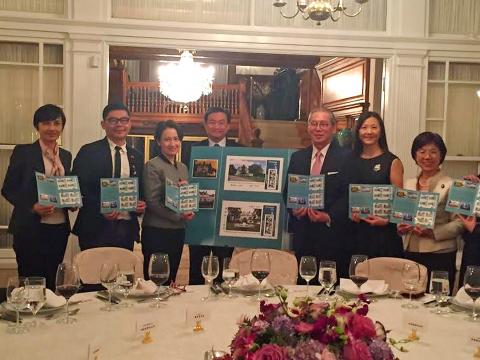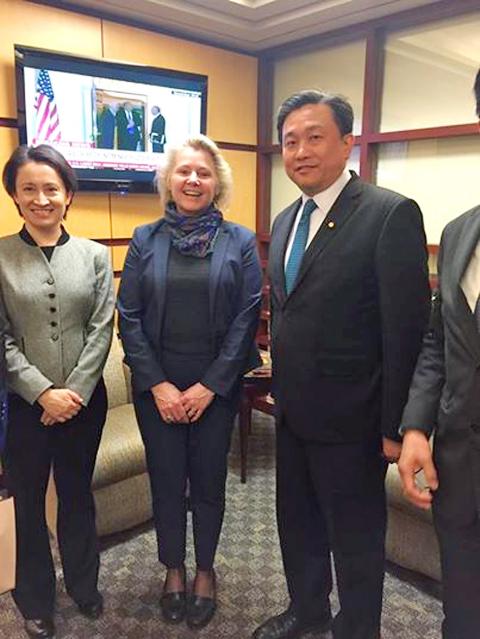A delegation from the Taiwan-USA Inter-Parliamentary Amity Association on Wednesday visited the US Department of State in Washington to meet Principal Deputy Assistant Secretary of East Asian and Pacific Affairs Susan Thornton.
Democratic Progressive Party (DPP) Legislator Wang Ding-yu (王定宇), one of the eight legislators in the delegation, said the meeting signified more stable Taiwan-US relations.
While Taiwanese legislators have visited the State Department individually before, it was the first time they were able to meet senior US officials as a group, Wang said on Wednesday night at the Twin Oaks Estate in Washington.

Photo: Nadia Tsao, Taipei Times
US Secretary of State Rex Tillerson has not yet tapped an official to head the bureau, but there are signs that US President Donald Trump’s government is leaning toward a continuation of policies enacted by former US president Barack Obama’s administration in its second term by gradually changing some guiding principles, which restricted US actions, on certain policies for the potential normalization of relations with Taiwan.
DPP Legislator Hsiao Bi-khim (蕭美琴) said the delegation’s visit focused on issues relating to finance and trade, national security and Taiwan’s participation in global events.
Taiwan is especially concerned if Trump’s Asia-Pacific financial policies would focus on bilateral accords, Hsiao said.

Photo from Wang Ding-yu’s Facebook account
Although Trump’s attitude toward international organizations and multilateral treaties appears to be far different from past US policies, Taiwan should endeavor to win the US’ support for its participation in international events and organizations, she added.
As for Taiwan’s participation in this year’s World Health Assembly, Wang said the Taiwanese delegates had broached the subject with their US counterparts.
The US is concerned and would do its best, but Taiwan must rely on itself, Wang said, adding that while the US is supportive of Taiwan, it must prioritize its own national interests.
Chinese Nationalist Party (KMT) Legislator Johnny Chiang (江啟臣) said that Trump would want to do something different from his predecessor, and would prioritize US benefits and interests, but in the grand scheme of things, he would likely return to pursuing normal relations with a majority of countries.
DPP Legislator Yu Mei-nu (尤美女) said that some Washington hands, citing Japanese Prime Minister Shinzo Abe as an example, said Taiwan could learn from Tokyo by making its own propositions based on the nation’s needs and interests, and should not passively wait for Trump to make a decision.
Earlier on Tuesday, Wang wrote on Facebook that the delegation met US Representative Ed Royce, Republican chairman of the House Committee on Foreign Affairs, and US Representative Ted Yoho, Republican chairman of the House Asia and Pacific Subcommittee, on the second day of their trip.
The delegation talked with the two congressmen on issues concerning ways to boost Taiwan-US links, Wang wrote.
The two US representatives gave positive feedback on Taiwan’s hopes to be one of the first economies to begin talks with the Trump administration on bilateral trade relations, a proposed Taiwan Travel Act and Taiwan’s bid for international participation, Wang wrote.
The delegation also met US Senator Ben Cardin, Democatic member of the Senate Committee on Foreign Relations, and two Republican senators, Steve Daines and Bill Cassidy, Wang said.
“The advantage of interacting with lawmakers is that we can talk about everything. We do not have to avoid sensitive issues,” Chiang wrote on Facebook on Tuesday.
Chiang said they talked about the future of the US’ “one China” policy; US trade strategies and Taiwan-US bilateral trade relations after Washington withdrew from the Trans-Pacific Partnership (TPP) last month; US arms sales to Taiwan; and Taiwan’s pursuit of independence in national defense.
Chiang added that be it in the Senate or House of Representatives, a Republican or a Democrat, most US lawmakers expressed hope for closer cooperation between Taiwan and the US in the areas of trade, economy and security.
The US legislators believe that even without the TPP, Taiwan and the US can continue their trade and economic relationship through a one-on-one channel, he said.
Additional Reporting by CNA

‘DENIAL DEFENSE’: The US would increase its military presence with uncrewed ships, and submarines, while boosting defense in the Indo-Pacific, a Pete Hegseth memo said The US is reorienting its military strategy to focus primarily on deterring a potential Chinese invasion of Taiwan, a memo signed by US Secretary of Defense Pete Hegseth showed. The memo also called on Taiwan to increase its defense spending. The document, known as the “Interim National Defense Strategic Guidance,” was distributed this month and detailed the national defense plans of US President Donald Trump’s administration, an article in the Washington Post said on Saturday. It outlines how the US can prepare for a potential war with China and defend itself from threats in the “near abroad,” including Greenland and the Panama

A magnitude 4.9 earthquake struck off Tainan at 11:47am today, the Central Weather Administration (CWA) said. The hypocenter was 32.3km northeast of Tainan City Hall at a depth of 7.3km, CWA data showed. The intensity of the quake, which gauges the actual effect of a seismic event, measured 4 in Tainan and Chiayi County on Taiwan's seven-tier intensity scale, the data showed. The quake had an intensity of 3 in Chiayi City and County, and Yunlin County, while it was measured as 2 in Kaohsiung, Nantou County, Changhua County, Taitung County and offshore Penghu County, the data showed. There were no immediate reports of

The Chinese Nationalist Party (KMT) is maintaining close ties with Beijing, the Democratic Progressive Party (DPP) said yesterday, hours after a new round of Chinese military drills in the Taiwan Strait began. Political parties in a democracy have a responsibility to be loyal to the nation and defend its sovereignty, DPP spokesman Justin Wu (吳崢) told a news conference in Taipei. His comments came hours after Beijing announced via Chinese state media that the Chinese People’s Liberation Army’s Eastern Theater Command was holding large-scale drills simulating a multi-pronged attack on Taiwan. Contrary to the KMT’s claims that it is staunchly anti-communist, KMT Deputy

RESPONSE: The government would investigate incidents of Taiwanese entertainers in China promoting CCP propaganda online in contravention of the law, the source said Taiwanese entertainers living in China who are found to have contravened cross-strait regulations or collaborated with the Chinese Communist Party (CCP) could be subject to fines, a source said on Sunday. Several Taiwanese entertainers have posted on the social media platform Sina Weibo saying that Taiwan “must be returned” to China, and sharing news articles from Chinese state media. In response, the Mainland Affairs Council (MAC) has asked the Ministry of Culture to investigate whether the entertainers had contravened any laws, and asked for them to be questioned upon their return to Taiwan, an official familiar with the matter said. To curb repeated